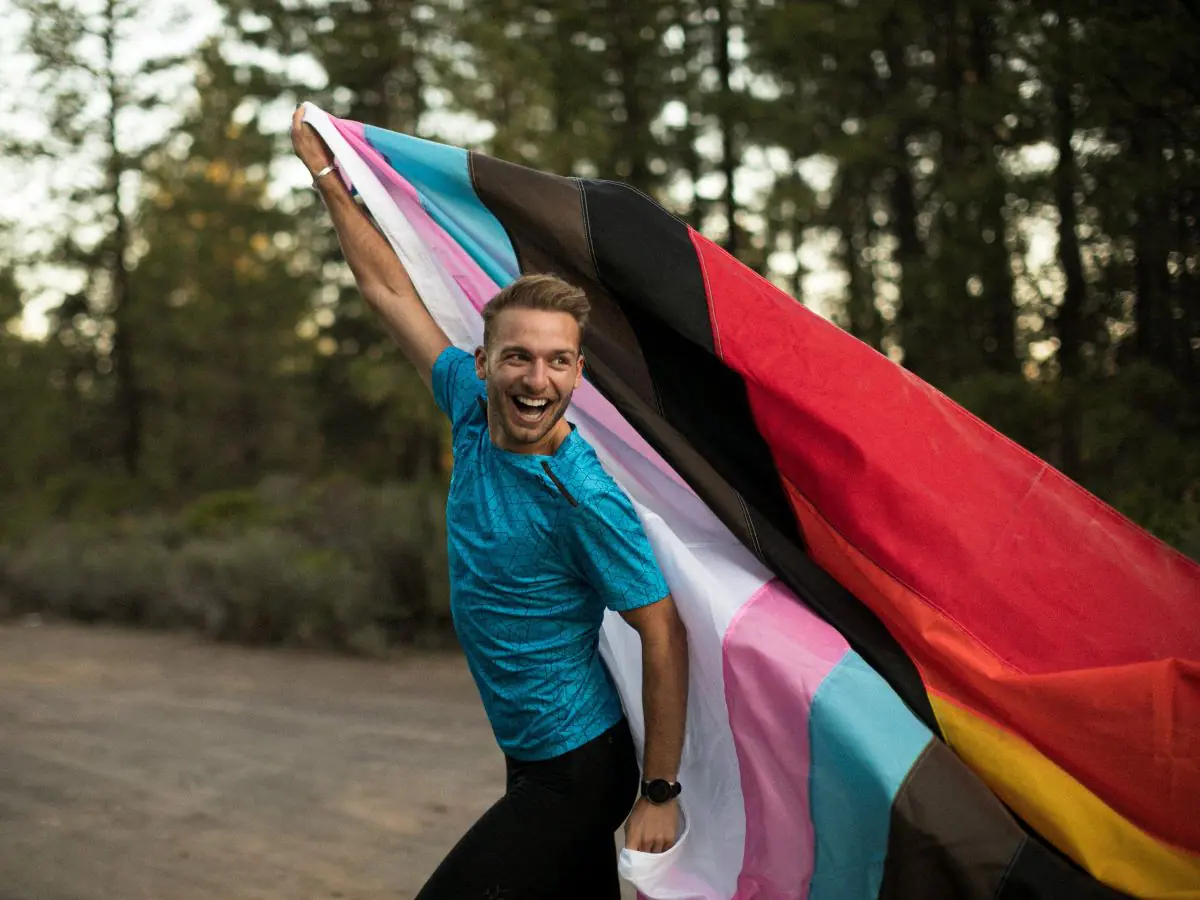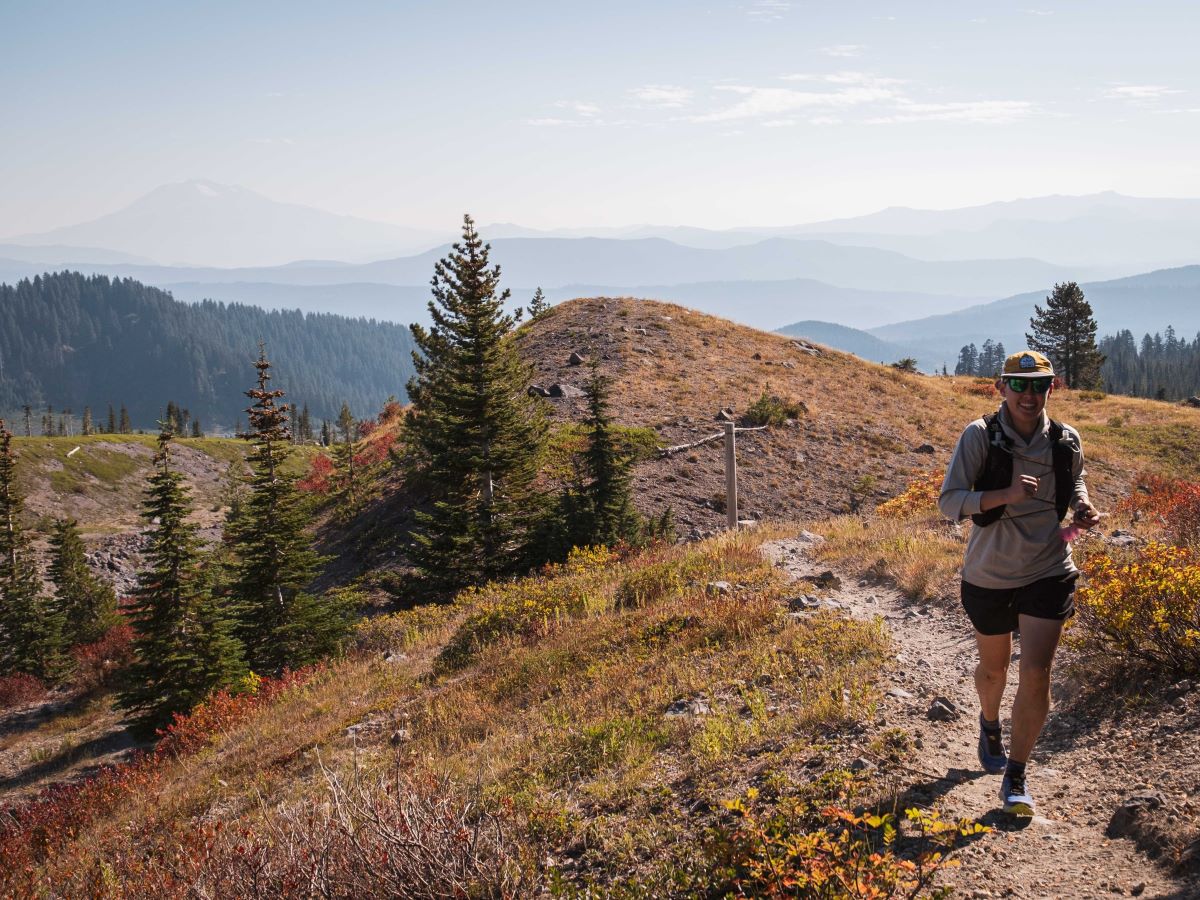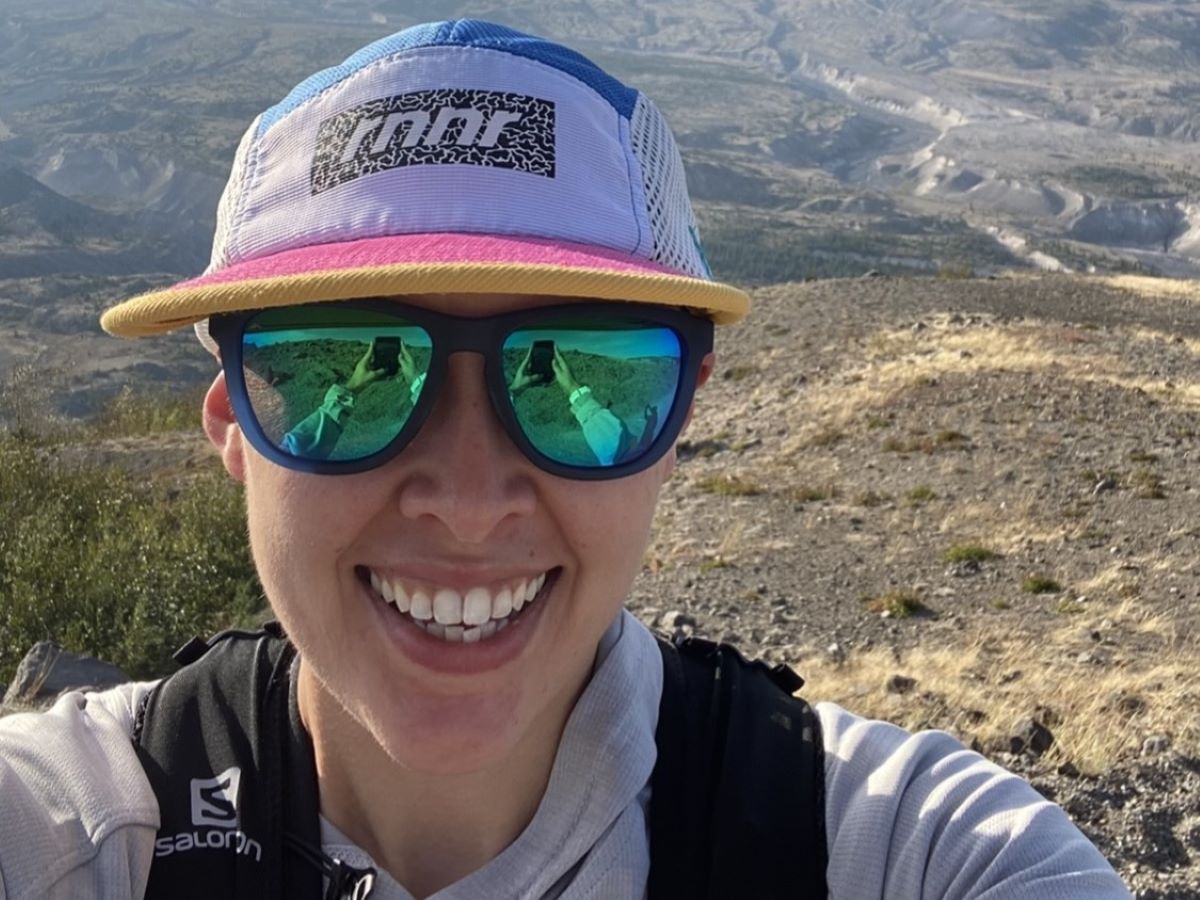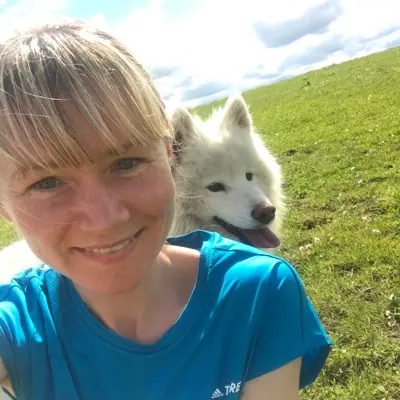One weekend in October 2022, a group of runners descended on Washington state’s iconic Mount St. Helens for two days of running the spectacular trails in its surrounds, and three nights of sharing meals and good conversation. They would follow the famed Loowit Trail, which circumnavigates the mountain, and take in the breathtaking landscape left in the wake of the mountain’s historic 1980 eruption.
But the weekend was about a lot more than covering miles and crushing vert in incredible terrain — this was the inaugural gathering of the LGBTQ+ trail running community Out Trails. Runners came from far and wide, many arriving alone, but would leave having forged deep friendships and with the feeling that they were part of a wider family.
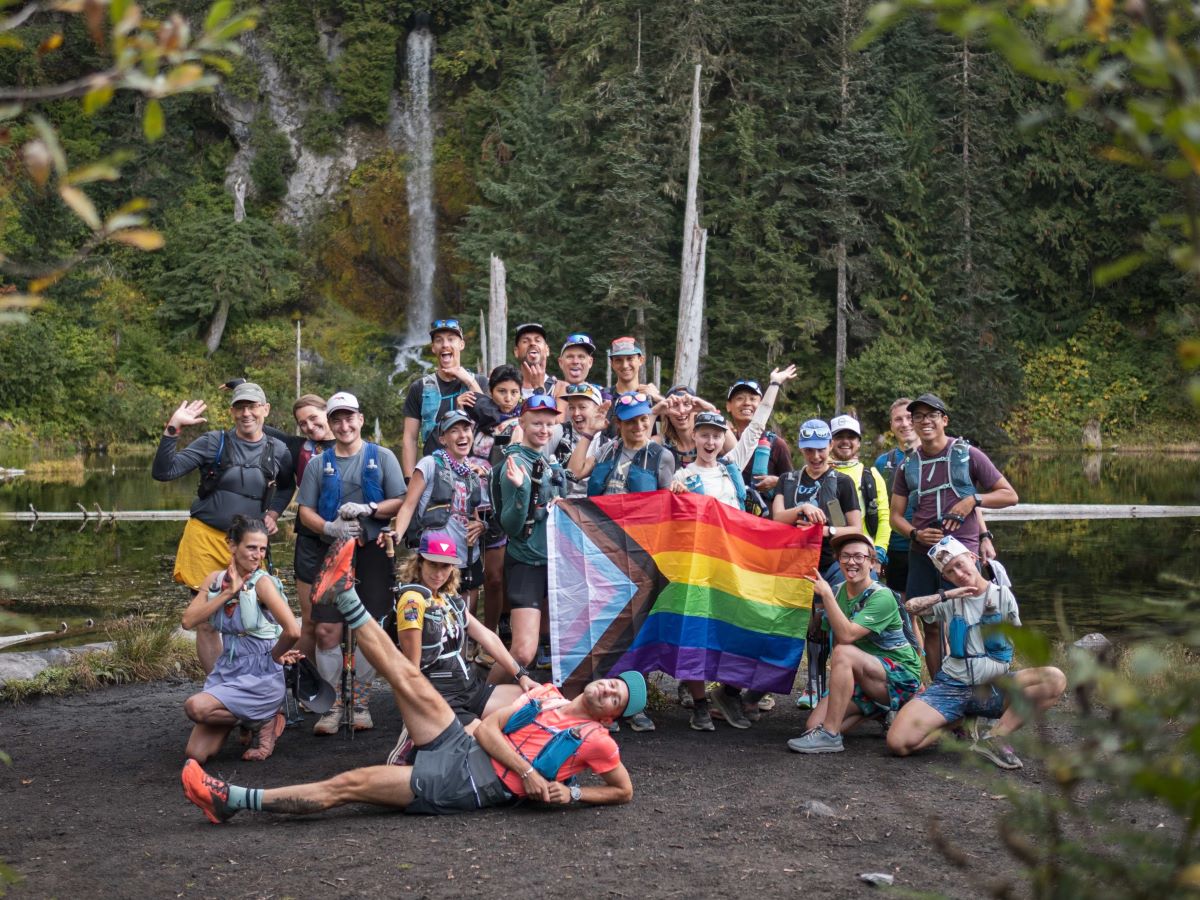
Attendees at the first Out Trails running retreat at Mount St. Helens, in Washington, in October 2022. All photos unless otherwise noted: Nick Danielson
Ryan Montgomery is an elite ultrarunner, part-time run coach, and technology professional. He is also a proud member of the LGBTQ+ community. His brainchild, Out Trails, is making a positive difference in the lives of LGBTQ+ runners throughout the U.S. — and hopefully in time, beyond.
Montgomery, who identifies as nonbinary on the gender spectrum and uses both “he” and “they” pronouns, told iRunFar, “A couple of years ago when I started becoming more visible as an elite athlete, I recognized that the opportunity to compete at an elite level also comes with the opportunity to make an impact in the sport. Running has been my conduit and my catalyst for really helping me to understand who I am — to come out of my own closet and to be comfortable with my own identity. Also, I’d been developing a community and a following through my Instagram.”
Montgomery decided to engage a little more with his followers and asked how many identified as LGBTQ+. So many people responded affirmatively, and Montgomery realized he was in a unique position, having access to a huge LGBTQ+ following within the outdoor community.
He asked some more questions of his followers to see how he could use this opportunity to make a difference, and there came a resounding response that people wanted an LGBTQ+ trail community — they wanted meet-ups and the opportunity to engage and run with others who had the same lived experience.
The idea for Out Trails was borne out of these online conversations. Since its inception, Montgomery has had an outpouring of support from experienced members of the LGBTQ+ trail running community, who have offered to come on board as run leaders, with ultrarunner, coach, and author Addie Bracy being one high-profile Out Trails ambassador.
After months of planning, promoting, and recruiting sponsors, Montgomery’s efforts came to fruition with the October running retreat, which he hopes will continue to take place annually as the community’s flagship event. In order to remove some barriers for participation, scholarships were offered to selected athletes to cover the full costs of the weekend’s activities. With the support of major brands in the outdoor industry, the scholarships included all the essential gear needed to safely and confidently take to the trails.
The retreat had 45 attendees, 20 of whom were on scholarships. The demographics of the group included 20 nonbinary people, five transgender men, and three transgender women — as well as 13 people of color, and all representations of sexual orientation.
Recognizing the need for diversity of all kinds within the trail running world, Montgomery said, “I’ve never been in such an intersectionally queer, diversity-rich, outdoor environment before — from the trans and nonbinary to the BIPOC [Black, Indigenous, and People of Color] community. There was representation from nearly every corner of the LGBTQIA community. That was so special, and I feel like everyone found a friend. That’s what it is all about.”
The three-day retreat involved two days of running. On the first day, athletes had the option of 17 or 24 miles. Montgomery said, “For some people, it was their first time running 17 miles and they found it really difficult, but everyone found a crew to support them on that journey.”
On the second day, runners could opt for a shorter route, or if they were up to it, embark on an all-day 44-mile adventure. The longer route took in the full Loowit Trail, a circumnavigation of the spectacular Mount St. Helens.

The routes took runners on some stunning trails around Mount St. Helens, but there was always time to stop for a photo!
The group ranged from experienced 100-mile racers to first-time trail runners, but the leaders ensured that everyone was catered to and sufficiently challenged within their level of comfort. As Montgomery put it, “Being physically challenged allows us to have more introspection about who we are. And having the opportunity to do that with this kind of community is great.”
He added, “I think for many of the participants, for the first time in their lives, the running retreat allowed them to see themselves in trail running — and to see that it is for them. Can you imagine the impact of being able to run with somebody like yourself, perhaps for the first time? That is powerful!”
Nick Pham, who lives in Portland, Oregon, joined the first Out Trails running retreat and was blown away by the experience. Pham is a nonbinary runner, who has been running local trails around Portland for some time, but hadn’t experienced anything like the epic trails of Mount St. Helens — or the solidarity they would find there with their fellow runners.
They arrived alone and said, “I knew no one and that was really scary for me, I was really nervous. But when you have people who have such core identity in common already, there was immediate and instant connection with people when we got there.”
Pham was one of the scholarship participants, who received as part of their scholarship package a vest from Ultimate Direction, a pair of shoes from Altra, a headlamp from BioLite, coffee from Summit Coffee, and sports nutrition from Gnarly Nutrition.
They said that being provided with the appropriate gear really helped participants to get the most out of their experience, “All those things they really add up. Gear is so expensive, and a lot of people were new to the trail running community, or just figuring it out on their own, and this really helped to make it possible.”
To perfectly illustrate the value of belonging to the Out Trails community, Pham recalled, “On the first morning before the run, we were all waiting on the balcony where our van was coming. We were overlooking this lake called Clearwater Lake and on it there was this tiny little island that had one tree on it. And someone pointed to it and said, ‘Oh that was me, queer in high school.’ And everyone just laughed. And it wasn’t a moment of laughing at them, we were laughing with them in solidarity because we know that struggle, we know that loneliness. And we could laugh because now — how many years later — we were not alone on an island. We were together doing something beautiful.”
As a nonbinary runner, Pham relished the opportunity to run with other nonbinary people. They had connected socially online with other nonbinary runners, but prior to Out Trails had not had the outlet to do so in person. Unfortunately, the main structure for socializing and forming friendships for binary, cisgender runners — busy race calendars — is not so straightforward for nonbinary runners, with many races not yet offering a nonbinary category for registration. For many, they resort to selecting a binary gender, which does not represent them, as the only option to keep racing — while others feel outcast entirely from most races.
Pham says, “For me, I really want to keep running, but I don’t want to run under a binary gender category, I only want to run where they have a nonbinary category. Often when we see a race we want to sign up for in the future, we have to email the race registration platform, and then email the race director, and often there’s so much we have to navigate through to find out if we’ll be able to participate. Also, I need to look at where the race is going to be held, and if it’s a safe environment for me to be out. There are a lot of factors and a lot to juggle.”
Pham has found belonging to the Out Trails community helpful in dealing with feelings of exclusion that arise from this. Also, it has been helpful to have channels of communication open within the nonbinary running community so that they can let each other know when they find a race that is inclusive to nonbinary runners.
Montgomery has competed within the male category when no nonbinary option was available, but acknowledges that people have different levels of comfort with this and said, “I’m learning that there are so many trans and nonbinary runners who don’t do races, because they literally cannot without lying to themselves. Most races don’t have nonbinary categories, and for that reason a lot of people don’t even do trail races. The result is they are running alone, which makes it hard to find community.”
He continued, “There’s so much more education needed for key stakeholders in our sport, such as race directors and brands, to make it more inclusive.”
Following on from its successful launch, Out Trails has been hosting community runs in Seattle, Washington, and Salt Lake City, Utah, welcoming all LGBTQ+ runners and allies. These are smaller-scale, short evening runs, and Montgomery sees them as pivotal to developing community by allowing LGBTQ+ runners to connect with others in their locality.
He said, “The structure of our short-term goals is I want to have a broad global reach while still being quite local, because I think local organizations are where true community building comes from. So, the vision is to have hyper-local communities in key geographies around the U.S. — and hopefully beyond that in the future. And then I want to host retreat-style events, for the weekend or longer.”
Out Trails has a Slack channel — where organic chatter is already taking place, with runners sharing photos and stories and making plans — and Montgomery is continually looking at new ways to grow the community both on and offline.
For the remainder of the year, the group is scheduling more community runs in both Salt Lake City and Seattle. Next year, they plan to expand to the U.S. East Coast; San Francisco, California; Denver, Colorado; and beyond. There are also plans to repeat and expand the Mount St. Helens running retreat next autumn, to make it an even bigger celebration of diversity in the outdoors.
The sport of trail running and ultrarunning continues to grow and evolve, with many concerned that the growth in scale and popularity of the sport will take something from its small community feel. Initiatives like this — that promote diversity and inclusion, while holding firm on the value of local community — will help ensure that that evolution holds on to the best parts of our sport, while moving into a better and more equal future.
Call for Comments
- Have you run with Out Trails?
- What other LGBTQ+ running groups do you know of?
